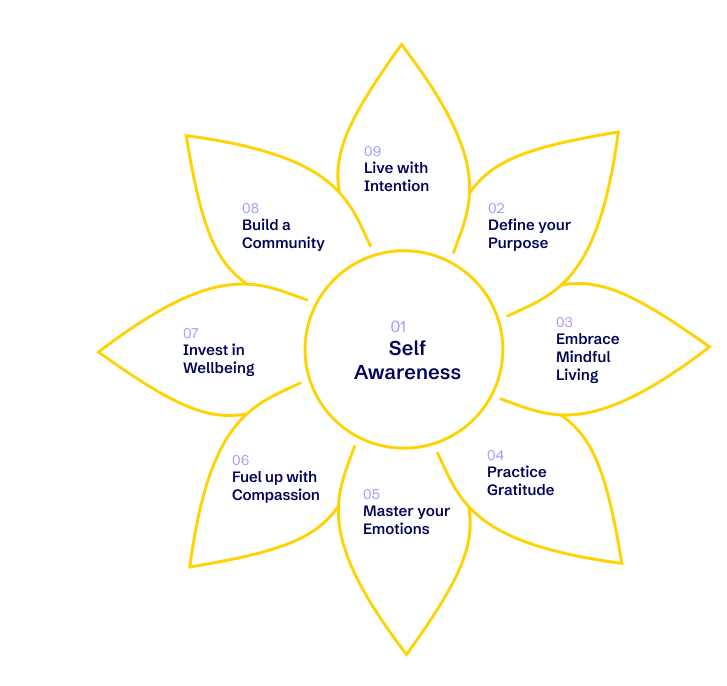Episode 84
Part 1: Breaking Free from Unhappiness Habits with Ashish Kothari
Despite living in a time of incredible prosperity, record-breaking GDP, and life-saving advancements, many of us feel increasingly stressed, anxious, and dissatisfied. This paradox—abundance alongside unhappiness—is what we’ll tackle in this episode of the HAPPINESS SQUAD Podcast with Ashish Kothari, Founder of HAPPINESS SQUAD.
In this episode, we’ll unravel the hidden habits that might be unconsciously chipping away at our well-being. Learn how to identify and break free from these "unhappiness habits" that hold you back from a more fulfilling life.
Things you will learn from this episode:
• “Unhappiness Habits” that drive lower life satisfaction and increased stress
• Happy practices that help fix your broken sleeping patterns
• How to kill the habit of comparison
• Breaking free from the addiction to technology
Tune in to this episode now and learn to identify and break the habits that contribute to your unhappiness.
Resources:
• Rewire Program: https://happinesssquad.com/rewire-program/
• The Happiness Squad on Apple Podcast: https://podcasts.apple.com/us/podcast/the-happiness-squad/id1663683864
• Happiness Squad Podcast: https://podcast.happinesssquad.com/
• Happiness Squad website: https://happinesssquad.com/
• Happiness Squad on Instagram: https://www.instagram.com/myhappinesssquad/
Books:
• Hardwired for Happiness: 9 Proven Practices to Overcome Stress and Live Your Best Life: https://www.amazon.com/Hardwired-Happiness-Proven-Practices-Overcome/dp/1544534655
Transcript
Hi, dear friends. Welcome to a new series I'm launching on our Happiness Squad podcast. This one is about habits that are making us unhappy or unhappier.
I was reflecting that in the U.S., we are living in a time of great prosperity. We are the number one GDP country in the world, living longer, and benefiting from breakthroughs that cure diseases. We are more connected than any other generation, and most things we do today can be done almost 90% faster.
With advancements like ChatGPT and AI, we've made significant leaps. Yet, we are busier than ever, lonelier than ever, and struggling with lifestyle-related chronic ailments. Worst of all, we are more stressed, more anxious, and less satisfied with life.
in:I became curious about why we are struggling despite our prosperity. I started exploring how we might be making unhappiness a habit rather than fostering habits that make us happier.
In this series, I want to cover what I call "unhappiness habits" we've picked up over the last 20-25 years, which drive lower life satisfaction and increased stress.
Broken sleeping patterns
Let's start with the first one. If you are listening, think about this: How many of you use your phone as an alarm clock or sleep with it right next to you? If you're like the average American, 89% of you check your phone within 10 minutes of waking up. In fact, 66% of you probably sleep with your phone very close by.
Why is this an unhappiness habit? Let's consider how we have changed and overridden the natural rhythms of sleep and wakefulness. Let’s look at the ill effects of what happens when we check our phones the first thing when we wake up.
When we wake up, most people use their phones to check emails, Instagram, or news first thing in the morning. News is filled with negative events because negativity sells, while Instagram shows perfect lives, making us feel inadequate.
Or maybe like most corporate people, checking work emails immediately brings the day's troubles and other people's agendas into our minds. This activates our fight-flight-or-freeze response just minutes after waking from hopefully restorative sleep. This sets a stressful tone for the day.
The moment we wake up is precious. Research shows it's a liminal period between the unconscious and conscious states, a time of creativity. We often give away this creative potential by letting technology intrude.
Start your day without your phone
My invitation to you is to try an experiment for a week or two: leave your phone outside your bedroom, perhaps in the living room. Use a traditional digital alarm clock, and when you wake up, spend five minutes just lying in bed, enjoying the transition between sleep and wakefulness.
Set an intention for your day—gratitude, curiosity, love, or compassion. Then, go about your day and notice how you feel at the end of the week or two weeks. Are you experiencing less stress and greater life satisfaction?
So that's habit number one. Now think about this, friends. It is a new habit because 25 years ago, cell phones with email didn't exist. It's something we've all picked up over the last 15-20 years, and now we say we can't live without them, but we can.
Only when we go back to living in rhythm with nature and take control back of those beautiful moments in the morning can we rewire away from fear and keep our fight-or-flight circuits more at rest until the day starts.
The habit of comparison
Let me talk about the second habit we've picked up or accentuated in modern times: the habit of comparison. We've always compared ourselves to others.
Cavemen likely looked at their neighbors to see if their caves were bigger or had more things because it was a survival instinct. If someone had more, their chances of finding a mate and passing on their genes were higher.
Fast forward, and we started comparing ourselves to our neighbors. Research shows it doesn't matter how much money you make; what matters is how your wealth or possessions compare to your neighbors'.
Now, with our addiction to social media—Facebook, Instagram, Twitter, YouTube—we are constantly comparing ourselves not just to our neighbors but to the whole world. We see what others have versus what we don't.
In those moments, we forget that Instagram life is not real life. It is the most perfect version of life. Those posting their best times also have their worst times and struggles, but they aren't posting about those.
They are posting their best moments to portray a certain picture, and we take that as reality. We feel less than, not smart enough, rich enough, thin enough, or fair enough—whatever the case may be. In effect, we feel unworthy.
To make up for that unworthiness, we push ourselves to work harder and be busier. We live from a place of dissatisfaction and convince ourselves that wanting more and more is doing us good.
Focus on what you have
But friends, recognize this: Our desire within, our hunger within, is not for more; it's for all. If we want to find happiness and satisfaction, we have to control our wants. Focus on where you are and what you have, rather than continuously looking at the next person.
Even though we have so much more than previous generations, more than our parents and grandparents, the comforts and luxuries we enjoy were not even enjoyed by kings and queens of yesteryears.
If you are going to compare yourself, try this different habit: Compare yourself to those who have less than you. If you feel your house is not big or comfortable enough, compare yourself to those in Gaza or Ukraine who don't have a house and are living in tents.
If you think your kids' school isn't the best, remember many in the world have no access to school at all. If your leg is hurting or you've broken it, think about those who have lost their legs trying to protect us.
We can always find people around us who are less blessed. So, if you have to compare, I invite you to compare yourself to those who have less and feel grateful for how much you do have.
Addiction to technology
Now here's my third practice: the third unhappiness habit. This is our addiction to smartphones we've built over the last 20 years. I'm reminded of a Batman movie featuring the Riddler, who created a device that sucked the brainwaves out of people through their TVs, taking all their intelligence. Smartphones are a version of that.
ews.org, it was found that in:I remember it was about 20 years ago, actually, that I first went to Six Flags. I moved to the US in ‘97. Around ‘99 to 2000, I had a chance to go to a Six Flags and I loved it. But one thing that was clear when I was there, as I reflect back in that moment, there were long queues.
When we were standing in queues, we looked around, talked to the neighbors behind, exchanged stories, and connected. We noticed the beauty around us when we went for a hike outside.
Yes, we had to carry extra cameras because our phones didn’t have cameras, but we were present. When we went out to restaurants, we could connect to our spouses, our kids, because there were no iPads and there were no iPhones that took our attention away.
But now, even when we wait for two minutes in an elevator ride up, we pick out our phones when we wait at a red light, we pick up our phones. In fact, many adults and teenagers feel anxious without their phones, almost like they're oxygen devices. But we can survive without phones.
Create a habit of taking breaks
Let me explain why it's crucial to break this habit and create a habit of taking breaks. A recent study by Microsoft showed the effects of back-to-back meetings or constant engagement on our minds. Stress accumulates, and focus diverts.
Our brains, like our bodies, aren't meant to be constantly on. Without breaks, we don't allow our parasympathetic systems to restore balance, leading to rest and recovery. When we're constantly on our phones, we take in mostly negative news, which prevents our brains from relaxing. This results in overheating, loss of creativity, and exhaustion.
Instead of constantly checking your phone, I invite you to take one or two-minute breaks throughout your day. Every couple of hours, put your phone away, close your eyes, and take deep breaths.
Breathe for one to five minutes, noticing your breath going in and out through your nose, or go for a mindful walk. Observe the colors, flowers, and surroundings. Train your brain to be present in the moment.
By doing this, you'll start to override your dopamine addiction and create more rest and recovery, recharging yourself throughout the day. Another helpful tip is to change your phone's screen to black and white. Behavioral scientists at tech companies use colors and notifications to attract your attention. Switching to gray mode may reduce your urge to check your phone.
Closing remarks
I hope these tips help you understand how certain habits are making us unhappy. I would love to hear your thoughts on these unhappiness habits or other habits that contribute to your unhappiness.
Please share your experiences and comments on LinkedIn. Together, we can break these habits and build happier ones. Join me in this journey, and I'll continue to release more short series highlighting these habits. Thank you, and have a great day.



